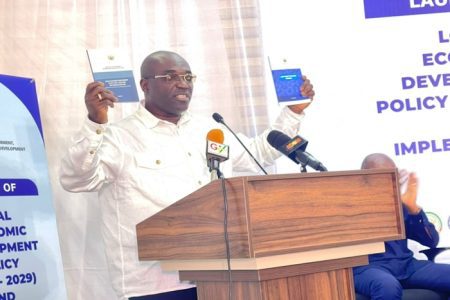The Minister for Local Government, Decentralisation, and Rural Development, Martin Adjei-Mensah Korsah, has unveiled Ghana’s new Local Economic Development (LED) Policy and Implementation Plan (2024-2029), with promises to create thousands of jobs and foster economic empowerment in communities across the country.
Speaking at the launch event at the Institute of Local Government Studies (ILGS) in Accra, the Minister emphasized that the policy marks a pivotal step toward building sustainable, self-reliant local economies.
He assured that the LED policy would serve as a strategic tool for addressing unemployment and poverty, particularly in underserved areas.
“The LED Policy is a roadmap for empowering our local economies by utilizing the resources we have in every corner of the country. We will create a conducive environment for businesses to thrive, provide decent employment opportunities, and ensure that no one is left behind,” said Korsah.
A new approach to economic development
The LED policy adopts a bottom-up approach, focusing on leveraging the unique strengths and resources of various localities to create jobs and stimulate economic growth.
With the growing expansion of the informal economy and the weakening of traditional employment sources, LED strategies are now being seen as critical tools for fostering sustainable job creation and social inclusion.
As decentralization reforms continue to take hold across many countries, Ghana’s LED policy aims to capitalize on this by promoting stronger coordination between national and local economic initiatives.
By connecting localities to national and cross-border markets, the policy seeks to unlock new economic opportunities for communities, particularly through the growth of local entrepreneurship, small and medium enterprises (SMEs), and agriculture.
Aligning with global development goals
The LED policy is aligned with global frameworks, including Sustainable Development Goal 8, which promotes inclusive and sustainable economic growth, and Agenda 2063, the African Union’s vision for long-term development.
By prioritizing local economic growth, Ghana aims to bolster its progress toward these goals.
Mr Korsah highlighted that the policy’s core focus will be on empowering Metropolitan, Municipal, and District Assemblies (MMDAs) to function as engines of growth.
This will be achieved by providing technical and financial support to local businesses, modernizing industrial zones, and fostering agricultural productivity.
Key job creation initiatives
The LED Policy also incorporates several key job creation initiatives, including the Ghana Productive Safety Net Project (GPSNP) and the Gulf of Guinea Northern Regions Social Cohesion (SOCO) Project.
These projects, which have already generated tens of thousands of jobs through infrastructure and livelihood support programs, will be expanded under the new policy.
Infrastructure development will also play a central role, with plans to upgrade urban markets and establish local economic hubs to stimulate private investment.
Additionally, skills training, access to financial services, and support for micro-enterprises will be extended to vulnerable groups, particularly women and youth.
A comprehensive guide for local implementation
Alongside the policy, the Ministry also launched a revised LED Practitioners’ Manual, designed to guide MMDAs in effectively implementing the LED initiatives.
The manual provides a framework for ensuring accountability and measurable impact from the LED projects.
“This policy is not just a document, it’s a call to action. We are determined to reduce poverty, improve incomes, and create jobs that will transform the lives of Ghanaians,” said Mr Korsah.
He urged MMDAs, businesses, and all stakeholders to collaborate in making the most of the opportunities presented by the LED policy.
The launch of the Local Economic Development Policy and Implementation Plan (2024-2029) marks a significant milestone in Ghana’s effort to create a more inclusive, locally-driven economy.
By harnessing the power of local entrepreneurship, supporting vulnerable communities, and building sustainable infrastructures, the LED policy promises to bring about long-lasting change that will transform lives across the nation.
The LED Policy is set to be a key driver in Ghana’s economic future, laying the groundwork for resilient communities, thriving businesses, and widespread job creation over the next five years.
- Fighting cocaine with the cross - 18 April 2025
- Galamsey, Cocaine: of truths, errors and the priest - 18 April 2025
- Human trafficking: EOCO arrests 219 members of West African cartel - 18 April 2025

